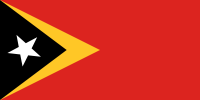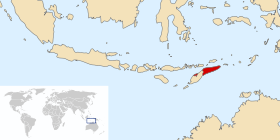- Telecommunications in East Timor
-
Telecommunications
Democratic Republic of Timor-Leste

 Landlines (2006):
Landlines (2006):3,000[1]  Mobile lines (2007):
Mobile lines (2007):103,000[1] ccTLD: .tl Calling code: +670 Contents
Telephone
Country code
Following Indonesia's withdrawal from East Timor in 1999, the telecommunications infrastructure was destroyed in the ensuing violence, and Telkom Indonesia ceased to provide services. A new country code (670) was allocated to East Timor by the International Telecommunication Union, but international access often remained severely limited.
A complicating factor has been the fact that 670 was previously used by the Northern Marianas, with many carriers not aware that the code is now used by East Timor. (The Northern Marianas, as part of the North American Numbering Plan, now use the country code 1 and the area code 670.)
Prices
Telephone calls are also often extremely expensive: for example, Telstra in Australia raised the cost of calls to East Timor to A$3.00 a minute from 97 cents in 2003. In the UK, BT's standard rate is nearly £2 a minute [1].
Companies
Telstra expanded its cellular telephone signal into East Timor in 2000, and operated services until 2003, when Timor Telecom, 50.1% part-owned by Portugal Telecom, began operating fixed line and mobile telephone services. Until recently, the fixed line network was mainly confined to the capital Dili, although this has been expanded nationwide, to each district capital.
Statistics
According to a press-release issued by Portugal Telecom, the total number of fixed phones (landline) are 3,000 and mobile cellular are 103,000 (as of June 2008). There is no broadband or ADSL service.
Investment
Portugal Telecom signed a 15-year contract in 2002 to invest US$ 29 million to rebuild and operate the phone system. The contract could be extended by 10 more years, totaling 25 years of monopoly. 2003 gross revenue totaled € 10.5 million.
Satellite link
All voice and data are carried out by Intelsat, using a direct satellite link with one hop to their downlink in Portugal.
Domestic System
As explained above, the domestic telephone system suffered significant damage during the violence associated with East Timorese independence. As a result, there is extremely limited fixed-line services, and mobile-cellular services and coverage are limited primarily to urban areas.[2]
Mobile Coverage
With this said, Timor Telecom offers mobile GSM services covering 69.5% of the population, 100% of the districts, and 57% of the sub-districts (map of mobile coverage).[3]
International System
International service is available in major urban centers, but not much elsewhere.[2]
Radio
There are at least 21 radio stations in East Timor.[2] The main station is Radio Timor Leste, broadcasting in Tetum, Portuguese and Indonesian. Other radio stations include Radio Kmanek, and Radio Falintil, and Radio Renascença, while there are also FM retransmissions of RDP Internacional from Portugal, Radio Australia, and the BBC World Service. Community radio stations broadcast around the country, in regional languages such as Tokodede and Fataluku.
Television
East Timor has one national public broadcaster,[2] Televisão Timor Leste or Televizaun Timor Lorosae, which broadcasts local programming in Tetum and Portuguese, as well as retransmissions of RTP Internacional from Portugal.
In May 2007, RTTL's television and radio services became available via satellite, using a transponder leased from Telkom Indonesia.[2][3].
In February 2009, TVTL began carrying programmes from Rede Globo in Brazil.[4]
Internet
The internet country code for East Timor is currently .tl. This code was officially changed from .tp (for Portuguese Timor) when the country achieved its independence on May 20, 2002.
East Timor has approximately 1,200 Internet users (2006) and 285 Internet hosts (2008). The vast majority of users use dial-up in lieu of broadband, as only 50 hosts offer any broadband service.[1]
Internet Service Providers (ISPs)
There is only one ISP in East Timor, Timor Telecom. Two-way Satellite Internet is in theory available, as the country falls within the Australian and Asian footprints of several satellites offering this service, however in practice licences are not granted for use of non-East Timorese Telecom services. As such, internet services are restricted to locations with landline telephone or dedicated line infrastructure. WiMAX and GPRS internet access are not available.
Voice over IP (VoIP)
Timor Telecom has sought to block some Voice over IP services on its network such as Skype. As a result, some such services may not function.
References
- ^ a b c Portugal Telecom press-release from Aug 2008
- ^ a b c d CIA World Factbook, 2009: East Timor
- ^ Timor Telecom: Mobile Services: http://www.timortelecom.tp/eng/movel_uk.html
 This article incorporates public domain material from the CIA World Factbook document "2009 edition".
This article incorporates public domain material from the CIA World Factbook document "2009 edition".External links
Telecommunications in Asia Sovereign
states- Afghanistan
- Armenia
- Azerbaijan
- Bahrain
- Bangladesh
- Bhutan
- Brunei
- Burma (Myanmar)
- Cambodia
- People's Republic of China
- Cyprus
- East Timor (Timor-Leste)
- Egypt
- Georgia
- India
- Indonesia
- Iran
- Iraq
- Israel
- Japan
- Jordan
- Kazakhstan
- North Korea
- South Korea
- Kuwait
- Kyrgyzstan
- Laos
- Lebanon
- Malaysia
- Maldives
- Mongolia
- Nepal
- Oman
- Pakistan
- Philippines
- Qatar
- Russia
- Saudi Arabia
- Singapore
- Sri Lanka
- Syria
- Tajikistan
- Thailand
- Turkey
- Turkmenistan
- United Arab Emirates
- Uzbekistan
- Vietnam
- Yemen
States with limited
recognition- Abkhazia
- Nagorno-Karabakh
- Northern Cyprus
- Palestine
- Republic of China (Taiwan)
- South Ossetia
Dependencies and
other territories- Christmas Island
- Cocos (Keeling) Islands
- Hong Kong
- Macau
Categories:- Communications in East Timor
- Telecommunications companies of East Timor
Wikimedia Foundation. 2010.

